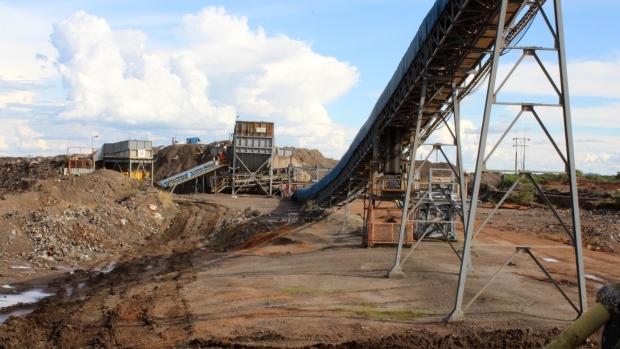Oct 26, 2023
Trafigura-Backed Congo Miner Puts Itself on Sale Amid Debt Woes
, Bloomberg News

(Bloomberg) -- A mining company in the Democratic Republic of Congo backed by commodity trader Trafigura Group has put itself up for sale after a slump in the cobalt price left it struggling to finish key projects.
The attempted sale of Chemaf Resources Ltd. comes after the company’s ambitious expansion drive ran into financial trouble, leaving it in need of fresh investment. The firm is trying to build one of the biggest copper and cobalt mines in Congo, as well as two new processing plants, and last year arranged a $600 million loan from Trafigura. However, Bloomberg reported in August that the trading giant was seeking new funding for the development after it overshot its budget.
Now, interested buyers are being invited to bid for the whole of the Isle of Man-registered Chemaf in a sale process that was launched in early September, according to a document seen by Bloomberg. The request for proposals – signed by Chemaf founder and chairman Shiraz Virji – asked prospective owners to submit non-binding offers by Oct. 17, and included a requirement that bidders also commit the $250 million to $300 million still needed to complete the construction of Chemaf’s projects.
The deadline has since been extended to allow more time, according to a person familiar with the matter. Chemaf is also open to other deals beyond a full sale of the company– including a joint venture – as its priority is a capital injection, and it is targeting a valuation of about $1 billion, said the person, who asked not to be identified discussing private information.
The document also says that Chemaf’s main subsidiary in Congo is subject to a “preventative settlement arrangement” that was approved by a local court in August, and which gives the company an opportunity to restructure its debts while barring creditors from bringing claims against the firm. Chemaf intends for this process to be concluded as part of any acquisition, the document said.
A spokesperson for Chemaf declined to comment.
Details of the court-approved arrangement and subsequent sale process provide the clearest picture yet of the difficulties facing Chemaf — a longstanding partner of Trafigura — and the extent to which the trading house’s bet has gone wrong. The setbacks have added to the pressure on Trafigura’s metals unit, which was already in the spotlight after falling victim to a massive alleged nickel fraud and has been increasingly overshadowed by the more profitable energy business.
The saga also highlights a glaring incongruity across the metals world: prices have tumbled sharply for battery metals like cobalt and nickel that will be critical to the global energy transition, even as governments and manufacturers are rushing to secure future supplies of critical minerals.
Chemaf Resources and its subsidiaries have about $690 million of debt, including about $510 million that has been drawn of the loan arranged by Trafigura, according to the document. However, it noted that one of the challenges facing the projects is “existing debt not being available for full draw” — suggesting that access to the remainder of the facility has been restricted.
Trafigura, which announced the $600 million in financing in January last year, syndicated the loan to banks led by the Eastern and Southern African Trade and Development Bank, known as TDB, although it still retains a significant exposure, according to people familiar with the matter.
Jeremy Meynert, a lawyer and investment banker who has previously worked for Fortescue Metals Group Ltd. and Resolute Mining Ltd., has been hired as an adviser on the deal, according to the document. He will help “realize value” for the company’s “equity holders, debt holders and off-taker,” it said.
Trafigura is “supportive of Chemaf’s efforts to conclude a successful sale process,” said Daniel von Arx, the company’s head of battery metals. Trafigura declined to comment further.
TDB and Congo’s Mines Ministry didn’t respond to a request for comment. Congo’s state miner, Gecamines, which rents a key permit to Chemaf, said in response to questions that it would need to approve any change of leaseholder.
Chemaf, which has a relationship with Trafigura dating back more than a than a decade and a half, has been planning since at least 2018 to build a large plant at Mutoshi, in Congo’s Lualaba province, that would be capable of producing more than 20,000 tons of cobalt a year.
The project has experienced multiple delays, hampered by slumps in the price of cobalt hydroxide – the intermediate form produced by Chemaf and other Congolese miners which has been hit particularly hard amid booming supply and a slowdown in Chinese demand.
If Mutoshi is completed and starts up, Chemaf would become the fourth-largest producer of cobalt, according to estimates from specialist trading house Darton Commodities.
Chemaf has invested more than $570 million so far on Mutoshi and an upgrade at its existing Etoile operation, which are 80% to 85% complete, according to the document. It blamed the funding gap on “inflationary pressures across the global mining sector,” a “soft cobalt pricing environment” and the unavailability of the full loan.
Chemaf has asked bidders to disclose whether they intend to restructure any of the company’s debt or modify Trafigura’s existing off-take contracts with the firm, according to the document.
The company’s owners and creditors – chief among them, Trafigura – will have to work together to finalize a successful transaction with an investor, said the person familiar with the matter.
--With assistance from Jack Farchy, Archie Hunter, Thomas Biesheuvel and Matthew Hill.
(Updates with additional details.)
©2023 Bloomberg L.P.






